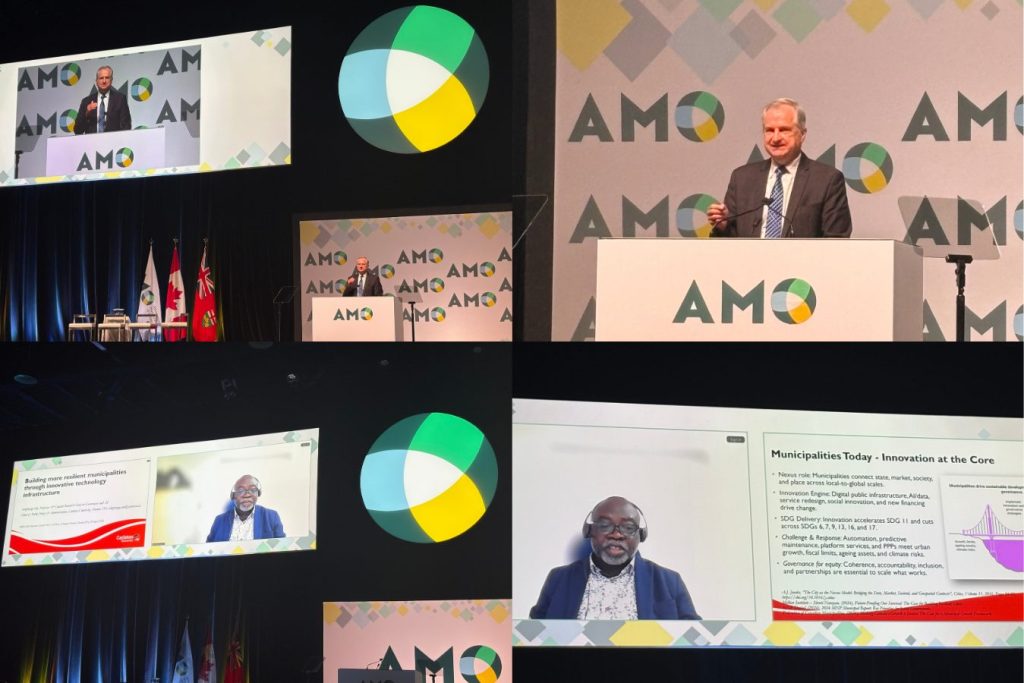TORONTO, August 25, 2025 – Ontario’s digital future is being built through powerful partnerships between universities and municipalities – and this year’s Association of Municipalities of Ontario (AMO) Conference, showcased just how transformative those collaborations have become.
For the fourth year in a row, the Council of Ontario Universities (COU) partnered with AMO to host a keynote at the conference. The session, “Building Resilient Municipalities Through Innovative Technology Infrastructure”, brought municipal and university leaders together to highlight how digital innovation, applied research and highly skilled talent are reshaping communities across the province.
Driving Local Solutions that Power Ontario’s Digital Economy
COU President and CEO Steve Orsini opened the session by underscoring the strength of university-municipal partnerships. Noting that even in a time of economic uncertainty, one thing remains clear: research, innovation and collaboration are essential to building strong and resilient communities.
“Together, we’re solving real local challenges,” Orsini said. “From using AI to improve city services to training cybersecurity and data science talent that helps protect public systems.”
That collaboration is already producing tangible results across Ontario:
- Kingston – Queen’s University’s Ingenuity Labs are using drones and sensors to help the City monitor Waaban Crossing, ensuring safety and efficiency.
- Hamilton – McMaster researchers are working with City staff to optimize budgeting and reporting systems as demands on services grow.
- Brampton and Toronto – Toronto Metropolitan University’s Rogers Cybersecure Catalyst and AMO delivered critical municipal cybersecurity training to help protect digital city services.
- North Bay – University students partnered with city officials to digitize fire hydrant inspections, making the service faster and more efficient.
- Sudbury to Milton – Universities are helping municipalities modernize digital infrastructure, create climate-smart systems, and adopt clean energy solutions.
There are many more examples in our new booklet, Partnering to Power Ontario’s Digital Future demonstrating how Ontario’s universities are advancing research, talent and technology to support Ontario’s communities.
Beyond these examples, Ontario universities are fueling the province’s fast-growing AI sector – helping attract nearly $9.8 billion in venture capital, creating 80,000 new AI jobs and graduating nearly 5,000 AI master’s graduates between 2019–20 and 2024–25, according to the Vector Institute.
Valuable Insights on AI and Public Infrastructure
Keynote speaker Dr. Adegboyega Ojo, Professor and Canada Research Chair in Governance and Artificial Intelligence at Carleton University, highlighted the transformative role of AI in building digital public infrastructure (DPI). He shared local and global examples of municipalities using AI not only to streamline services but also to rethink urban planning, emergency response, and infrastructure maintenance.
Dr. Ojo emphasized the importance of strong governance frameworks, sustainable funding, and policies that ensure equitable access, ethical data use, and robust cybersecurity. He explained how AI can enhance public service delivery, improve user experience, and support public safety in urban planning.
He highlighted Toronto’s Smart Traffic Management Pilot, where the City is testing a 5G-powered AI system that monitors vehicles, pedestrians, and cyclists in real time at key intersections. The pilot is designed to improve safety, reduce travel times, and prioritize public transit.
As municipalities confront climate change, economic pressures, and demographic shifts, Dr. Ojo emphasized that digital infrastructure is essential for resilience, and that strong governance, along with broad partnerships across cities, governments, academia, industry, and communities, will be crucial to ensuring innovation serves the public good.
Dr. Ojo concluded his remarks by providing recommendations for municipalities to adopt holistic digital resilience strategies that align AI and smart city initiatives with broader community goals. Key measures include dedicated innovation funding, shared AI and data resources for smaller municipalities, staff training in digital literacy and analytics, strong cybersecurity and privacy protections, performance-based funding tied to measurable outcomes, and proactive citizen engagement. By acting early and fostering broad collaboration, municipalities can set standards, secure resources, and create a blueprint for scalable, resilient digital transformation.
Partnering for Ontario’s Digital Future
Ontario’s universities are deeply committed to this work. Orsini closed his remarks by emphasizing, “Universities are ready to roll up their sleeves with municipalities – on campus, on main street and across every region of this province to build the future together.”
As dedicated partners with municipalities throughout the province, Ontario’s universities look forward to continuing to partner with AMO on the annual AMO-COU Lecture Series and will continue to bring university and municipal leaders together to drive digital innovation, strengthen infrastructure and help bridge the digital divide. To learn more about how Ontario’s universities, through collaboration with municipalities, businesses and industries, are supporting local digital infrastructure and providing solutions tailored to the needs of Ontario’s communities, read our booklet on Partnering to Power Ontario’s Digital Future.

